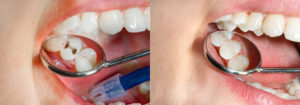Why Do My Fillings Keep Falling Out?

There’s nothing quite like the shock of realizing your filling has fallen out of your tooth. You might wonder why it happens and what you can do about it. Don’t worry—you’re not alone, and there are solutions to this problem. Let’s dive into the reasons why fillings fall out and how you can prevent it from happening again.
Is It Normal for Tooth Fillings to Fall Out?
It’s not normal, but it’s not uncommon for fillings to fall out. Fillings can fall out for various reasons, and it’s important to address the issue promptly to avoid further complications. Fillings are designed to last for several years, but certain factors can cause them to become loose or fall out sooner than expected.
Reasons Why Fillings Fall Out
1. Decay Around the Filling
When you get a filling, the dentist removes the decayed material from your tooth before placing the filling. However, if decay continues to develop around the filling or in another part of the tooth that connects to the filling, it can cause the filling to lose its grip and fall out. Regular dental check-ups can help prevent this by catching decay early.
2. Debonded Filling
Sometimes, fillings can fall out shortly after they are placed because of a debonding issue. This happens when the filling material doesn’t bond properly with the tooth, often due to a chemical reaction or improper placement. If your filling falls out soon after you get it, contact your dentist to have it replaced.
3. Bad Habits
Certain habits can put extra pressure on your fillings, causing them to loosen and fall out. These include:
- Grinding your teeth (bruxism)
- Chewing on hard objects like ice or pens
- Clenching your jaw, especially while lifting heavy objects or during stressful situations
Being mindful of these habits and trying to reduce them can help your fillings last longer.
How Do I Keep My Fillings from Falling Out?

There are several steps you can take to help keep your fillings in place and avoid the inconvenience of having them fall out:
1. Maintain Good Oral Hygiene
Brush your teeth at least twice a day and floss daily to keep your teeth and gums healthy. This helps prevent decay around your fillings.
2. Regular Dental Check-Ups
Visit your dentist regularly for check-ups and cleanings. Your dentist can check the condition of your fillings and catch any problems early before they cause the filling to fall out.
3. Avoid Bad Habits
Try to avoid habits that put excessive pressure on your fillings. If you grind your teeth at night, talk to your dentist about getting a mouthguard to protect your teeth.
4. Eat a Tooth-Friendly Diet
Avoid hard or sticky foods that can dislodge your fillings. Stick to a balanced diet that supports overall oral health.
Is It Normal for Bits of Fillings to Fall Out?
It’s not typical for bits of fillings to fall out, but it can happen. If you notice small pieces of your filling coming out, it’s a sign that the filling is compromised and needs to be checked by your dentist. Even small fragments can indicate that the filling is weakening and might eventually fall out completely.
How Many Times Can a Filling Be Replaced?
Fillings can be replaced multiple times, but there are limits. Each time a filling is replaced, a bit more of the natural tooth structure is removed, which can weaken the tooth over time. If a tooth has had several fillings replaced, your dentist might recommend a different solution, such as a crown, which can provide more stability and protection.
How Long Do Tooth Fillings Last?
The lifespan of a filling depends on the material used and how well you care for your teeth. Here are the typical lifespans for different types of fillings:
1. Amalgam Fillings
These silver-colored fillings are very durable and can last 10 to 15 years or even longer with proper care. They are often used for back teeth where chewing forces are greater.
2. Composite Fillings
These tooth-colored fillings are more aesthetically pleasing and are often used for front teeth or visible areas. They typically last 5 to 7 years, but can last longer with good oral hygiene and regular dental visits.
What Will Happen if I Don’t Repair My Missing Filling?
If you don’t repair a missing filling, you could experience several problems, including:
- Pain and Discomfort: The exposed area of the tooth can be sensitive to temperature changes and pressure, causing pain.
- Increased Risk of Decay: Without the filling, the tooth is more vulnerable to decay, which can lead to more serious dental issues.
- Tooth Loss: Severe decay and damage can eventually lead to the loss of the tooth.
Are There Different Types of Fillings?

Yes, there are different types of fillings, and each has its advantages and disadvantages. Here are the most common types:
1. Amalgam Fillings
Amalgam fillings are made from a mixture of metals, including silver, mercury, tin, and copper. They are very strong and durable, making them suitable for back teeth. However, they are visible when you open your mouth, which might not be ideal for everyone.
2. Composite Fillings
Composite fillings are made from a mixture of plastic and fine glass particles. They are tooth-colored, so they blend in with your natural teeth. They are a good option for visible areas of your mouth. However, they are not as durable as amalgam fillings and might need to be replaced more frequently.
3. Gold Fillings
Gold fillings are very durable and can last for many years. They are more expensive and require more than one visit to place. Some people prefer the look of gold, while others might not like its visibility.
4. Porcelain Fillings
Porcelain fillings, also known as inlays or onlays, are custom-made in a lab and then bonded to the tooth. They are tooth-colored and can be a good match for your natural teeth. They are also quite durable but are more expensive than other types of fillings.
Conclusion
Fillings falling out can be inconvenient and sometimes alarming, but understanding the reasons behind it and knowing how to prevent it can help keep your teeth healthy and your fillings in place. Maintaining good oral hygiene, avoiding harmful habits, and visiting your dentist regularly are key steps in preventing your fillings from falling out.
If you do experience a lost filling, don’t panic. Contact our dental office at 1-877-LANE-DDS to schedule an appointment. We can help you get back to a healthy, pain-free smile in no time. And if you’re curious about which type of filling is best for you, our team is here to provide the information and support you need to make the right choice for your dental health. Let us help you keep your smile beautiful and your teeth strong!

